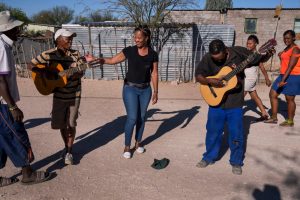
Jo-Ann Livey Van Wyk was diagnosed with HIV at the age of 17 while she was still at school, and this naturally changed her life forever.
“It all started out as being an innocent young child at school, and then I fell pregnant. I was 5 months pregnant at the time, when I received a phone call from the doctor saying I needed to come in immediately. I got there and there was a crowd waiting to tell me I have AIDS and was going to die,” she was quoted in 2013 by Namibian media, Namib Times.
Back then, people did not have adequate or the right information about AIDS, hence the stigma was high.
“The only thing I knew about HIV was that it was a death sentence. I didn’t want to die. I was only a kid and had a lot of dreams,” Wyk was quoted by UNICEF.
The transformation of her life began in 2001 when the deadly HIV/AIDS disease was widespread. Thousands of children and adolescents were infected in many parts of Africa, including her native Namibia. People were dying in their numbers as antiretroviral treatment was hardly available, neither was it free.
This created fear and panic among many societies, increasing the sort of stigma the infected ones had to go through.
“Even my own mother changed when I told her about my status. And the same thing happened over and over again in the family, in the community, in the city. I just couldn’t be with others any more. I was denied all rights.”
Wyk recalled that she had her own special water bottle to drink out of and her siblings were always told to wash the bath before they bathed because they might get infected.
The worst part of this was that she believed all of these things, and even at school, she was asked by her principal not to come to class anymore.
“That was my breaking point, because I loved school, even if I were pregnant and HIV-positive. At that moment I was hopeless.”
Her mother had then started planning her funeral, with others waiting for her to die but she didn’t, she said.

Not able to stomach these any longer, Wyk left to her grandmother’s in Witvlei, who accepted her wholeheartedly. The teenager would later learn more about HIV and what it meant and through that, she began loving herself more than before with the hopes that she would get support.
Thankfully, she got enrolled in a UNICEF supported programme helping to prevent mother-to-child transmission of HIV. Placed on antiretroviral treatment, Wyk gave birth to a baby boy and raised him with her grandmother.
“Remi is 13 years old now. He is my strength and my courage,” she said. “He made me wake up every morning and keep dreaming, keep believing and have hope.”
After giving birth, the teenager managed to complete school and obtain a certificate in project management. She also became one of the first Namibians to speak publicly about her HIV status to fight discrimination and stigma. She later told her story in a book, A Diary from the Land of the Brave.
From the young teenager who was abandoned, Wyk would rise to become the pride of her native country, getting invitations to speak at distinguished places including the United Nations General Assembly in 2007.
The fulfilled mother suddenly became one of the trusted and influential persons in her community to the extent that almost everyone in Witvlei threw their weight behind her to lead them as mayor.
“In 2010, the same community that had thrown stones at me, that literally had wanted to kill me, asked me to stand before them and show them that there is light at the end of the tunnel,” she said.
She became the youngest mayor in Namibia at the age of 26, bringing on board a huge housing project that benefits some of the poorest families in the town.
Carrying out civic and ceremonial duties for the mayoral office, Wyk managed council meetings without bias, ensuring that they were smooth and orderly.
Now out of office, Wyk, as of 2016, was a public relations officer under the German Special Initiative program, where she assisted in preparing organizational documents such as annual reports, corporate profiles, and submissions.
She has also worked with young people through charity organisations, discussing issues that affect youngsters, with a particular focus on HIV/Aids prevention and support.
“Definitely, my hope is for an HIV-free generation. Nothing is impossible. We can make it – especially when we have hope,” she said.
Despite numerous efforts to control the spread of HIV/AIDS, it remains a major public health concern and the main cause of death in many parts of Africa.
In 2016, there were 19.4 million people living with HIV (53%) in eastern and southern Africa and 6.1 million (17%) in western and central Africa, according to statistics by hiv.gov.
Some advances have been made in terms of understanding of HIV and its prevention and treatment yet there are still scores of people living with the disease who do not have access to prevention, care, and treatment.
Despite the challenges of food insecurity and other infectious diseases associated with HIV, some people are slowly winning the war on HIV/AIDS and Wyk is one of them.
BY MILDRED EUROPA TAYLOR
Source
